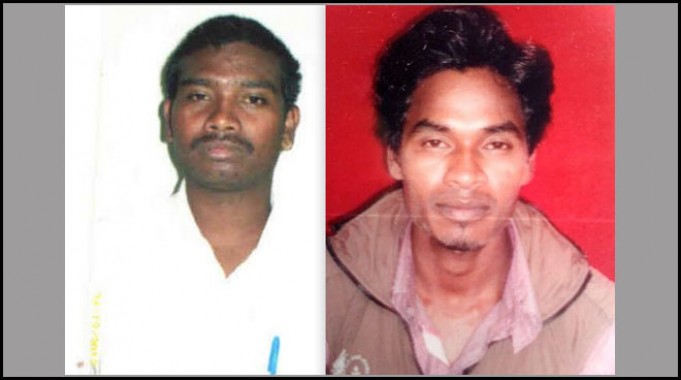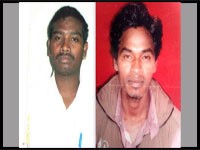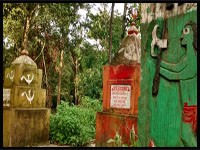The Editors Guild gets around to investigating Bastar
The Editors Guild of India constituted a fact finding team to investigate the “challenges to journalism in Bastar.” Two of its three members travelled to state and spent time in Raipur and Jagdalpur over three days. They talked to 24 people including the chief minister and two other politicians, eight police officers and bureaucrats, and 13 journalists one of whom was the convener of the controversial organization known as the Samajik Ekta Manch which local journalists described to them as the reincarnation of Salwa Judum.
The team coud not meet the man whose name is on the lips of every journalist in Bastar who feels insecure: Inspector General Bastar Range SRP Kalluri. He declined to meet them.
The team’s terms of reference were to “verify and assess recent reports of the arrests of journalists in Chhattisgarh, the threats and challenges faced by journalists in the state and the challenges to the profession of journalism.” It arrived at the conclusion that the media in Chhattisgarh is working under tremendous pressure. “In Jagdalpur and the remote tribal areas the journalists find it even more difficult to gather and disseminate news.”
The team said “there is pressure from the state administration, especially the police, on journalists to write what they want or not to publish reports that the administration sees as hostile. There is pressure from Maoists as well on the journalists working in the area. There is a general perception that every single journalist is under the government scanner and all their activities are under surveillance. They hesitate to discuss anything over the phone because, as they say, ‘the police is listening to every word we speak.’ “
The team was in Chhattisgarh before the two arrests of journalists earlier this month. Of the two journalists in jail they met one.
Extracts from the report:
Fear Factors
FFT could not find a single journalist who could claim with confidence that he/she was working without fear or pressure. The journalists posted in Bastar and the journalists working in Raipur, all of them spoke of pressure from both sides. They said that the journalists have to work between the security forces and the Maoists, and both sides do not trust journalists at all. All of them complained about their phone calls being tapped by the administration, and being kept under undeclared surveillance.
The government officials categorically denied these charges. Principal Secretary (Home) BVK Sumbramiam said, “I have to sanction every single request for surveillance and I can say this with authority that no govt. department has been authorized to tap phone calls of any of the journalists.” The journalists posted in Bastar said that they cannot dare to travel to the conflict zone to report because they cannot report the facts on the ground. Although collector Jagdalpur, Amit Kataria told the fact finding team that the whole of Bastar is now open for everyone, including journalists, the President of Divisional Journalists Association of Bastar, S. Karimuddin said, “I have not visited any place outside Jagdalpur for the last six years, simply because I am not supposed to write the truth and if one cannot write what one sees then there is no point going out to gather information.”
He represents UNI in Bastar for more than three decades. A similar claim was made by the Editor of a local newspaper Dilshad Niyazi who said that he had not visited the neighboring district Bijapur for the last eight years out of fear. Another senior local journalist, Hemant Kashyap, well travelled in the area said he knew Bastar like the back of his hand but that now journalists had stoppedravelling. “All the journalists have now stopped going inside the forests because of the fear of police as well as Maoists,” he said.
“Now we ask Maoist organizations to send photographs and press releases. We publish them as we receive them because we don’t want to explain every single line we are writing to them. Similarly the police expect us to publish its version so most of the journalists print their press releases as well without asking any questions,” Kashyap said. Malini Subramaniam who contributed to Scroll.in told FFT that even if someone dares to go out to gather information, one is not supposed to talk to the people. She said, “Police officials expect journalists to believe and publish whatever they claim. They don’t like it if someone wants to walk an extra mile for finding the facts. In one case of surrender, when I tried talking to a couple of people, they asked me to identify the persons I wished to talk and then they briefed them before I could reach them.”
The fact finding team found that this fear is not confined to the tribal areas only, but is there in the capital city Raipur too, 280 kilometers away from Jagdalpur. All the reporters working in Raipur also said that their telephones were tapped. Some of them shared incidents that confirmed this. A very senior journalist, who is considered to have a cordial relationship with the Raman Singh govt. said, “No one is spared, not even me. They have been tapping my phone calls too.”
Government officials denied this charge as reported earlier and claimed that not a single journalist is under surveillance. They said that there was a perception gap and they would try to change this. The chief editor of an old and reputed newspaper Lalit Surjan said that it had become extremely difficult for a journalist to do his/her job. During his meeting with the FFT he said, “If you want to analyze anything independently, you cannot do it because they can question your intentions and can ask bluntly, ‘Are you with the government for with the Maoists?” He admitted that this problem was not only with the government, but also with the Maoists.
He said, “Both sides feel that what you are writing is wrong.” Surjan said that it was becoming increasingly difficult to work in areas like Bastar as the journalists cannot avoid meeting Maoists, and the government is not prepared to give them even the benefit of the doubt. “The government should respect democratic rights and should give benefit of doubt to the journalists,” he said. He questioned the arrest of the two journalists Santosh Yadav and Somaru Nag and remembers Sai Reddy, who was killed by the Naxals, as a fine reporter.
Challenges faced by Journalism
A journalist working in Bastar expects to be asked “Which side of journalism?” This question appears a bit odd but in Bastar it comes naturally. As the local journalists put it, there are three categories of journalists in Bastar. 1. Pro-government, 2. Not so pro government and 3.Pro Maoists or Maoist sympathizers. The FFT found that there are nearly 125 journalists working in Jagdalpur alone.
********
Government’s response
The FFT met Chief Minister of Chhattisgarh Dr. Raman Singh at his residence. All top bureaucrats of the state were also present in the meeting. Editors Guild’s executive committee member Ruchir Garg and editor of a local daily Sunil Kumar were also present in the meeting. The Chief Minister said that he is aware of most of the incidents and he is concerned about it. He said that his government is in favor of free and fair media. He informed the fact finding team that after the controversy over the arrest of journalist Santosh Yadav he had called a meeting of top officials and some editors and formed a monitoring committee which will be consulted for any cases related to the media and journalists. Two editors are included as members of high level monitoring committee. About the phone tapping and surveillance allegations, the principal secretary (home) assured the team that he is the authority for sanctioning surveillance and he could say that not a single journalist is under surveillance. The principal secretary to the CM admitted that there is a perception gap and said it was the government’s responsibility to change this perception. The attitude of Bastar IG Mr. SRP Kalluri towards the press also came up in the meeting. The CM instructed the officials that the behavior of one officer should not take away all the credits of the good job the government is doing in Maoist area.
Some senior police official with credibility should be authorized to talk to the press, he said. Principal Secretary (Home) should visit Jagdalpur and interact with the media, the Chief Minister instructed. CM Dr Singh assured the FFT that his government has no prejudice against any one and he will personally take all necessary steps required to make media free of any kind of fear.
Samajik Ekta Manch
This is an informal but controversial organization in Jagdalpur. The administration calls it a citizen’s forum and claims that people from all walks of life are members of this organization. The collector of Jagdalpur, Amit Kataria said that many religious organizations are also part of it and they are against the Maoists. But many journalists call it the urban version of Salwa Judum. They, however, did not want to oppose it openly. They said off the record, that the Manch is sponsored by the police and it takes its orders from the police headquarters. The FFT met one of the coordinators of this organization Subba Rao to understand the working of the Samajik Ekta Manch. He introduced himself as editor of two dailies, one morning and the other published in the evening. When asked, whether his main occupation is journalism, Subba Rao was candid enough to explain that he is basically a civil contractor and he is working on some government contracts.
The FFT met more than a dozen journalists in Jagdalpur, but he was the only (so called) journalist who claimed that he had never experienced any pressure from the administration. His statements about the arrested journalists were the same as the administrations. He termed Santosh Yadav and Somaru Nag as informers for the Maoists. He said that what Malini Subramaniam was reporting was very biased. “Malini was glorifying Maoists and painting a picture of police like exploiter”, he said. He denied that the Samajik Ekta Manch was behind the attack at Malini’s residence.
*******
Cases and the findings
Santosh Yadav/ Somaru Nag
Santosh was arrested by the police on September 29, 2015. Police charged him for working as a courier for the Maoists and taking money from them. Government officials claim that Santosh Yadav is not a journalist and they don’t know which newspaper he was working for. The FFT met Santosh Yadav in the Central Jail in Jagdalpur and discussed the case with him. He claimed that he had been working for at least two newspapers Navbharat and Chhattisgarh. (Editors of both the newspapers confirmed that Santosh Yadav was working for them and they own him as a journalist working for their newspapers). Santosh Yadav admitted that he had been attending calls from the Maoist leaders because of the nature of his job but he had never passed any information to them. He also admitted that he had been occasionally dropping packets between Darbha a small town and Jagdalpur. Sometimes it was bundle of newspapers or magazines and sometimes some other papers he did not know anything about. He said that anyone who lives in remote area of conflict zone cannot risk his life by refusing the Maoists to carry a bundle of papers from one place to another.
The Chief Editor of the newspaper group the Deshbandhu, Mr. Lalit Surjan said during his discussion with the fact finding team, “Santosh Yadav and many other journalists working in remote area of Bastar should be given the benefit of doubt because they have been talking to Maoists as part of their job. They don’t have any choice.” He said that journalists of those remote areas are also talking to the police as part of their jobs and become victims of Maoist anger. Santosh Yadav told the FFT that he had been given money by a senior police officer and he was expected to pass information about the Maoists movements around the area, but did not do so. He claimed that after some news items published in the newspapers, he was called by the local police station and was tortured for three days. Somaru Nag was also arrested last year. He was basically a newspaper agent for a newspaper and also gathering news for the same. But the newspaper doesn’t own him now. Charges are same for him too.










